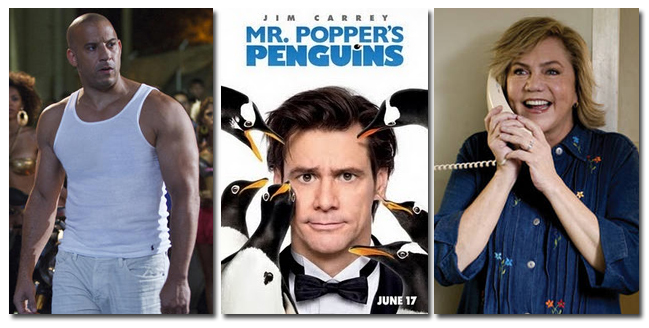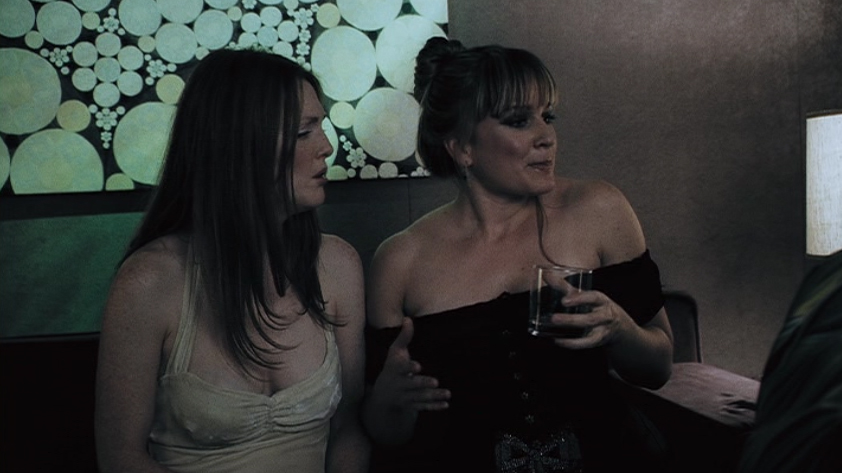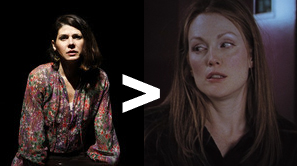I promised you a stage|screen colum each Tuesday. With the Tony Award nominations out this morning (see previous post), we already have so much to discuss but how is this for a twist on the flashback.
Remember this moment from the March 1995 Oscars? Tim Chappel and Lizzy Gardiner won Best Costume Design for the epic outback drag comedy The Adventures of Priscilla, Queen of the Desert.
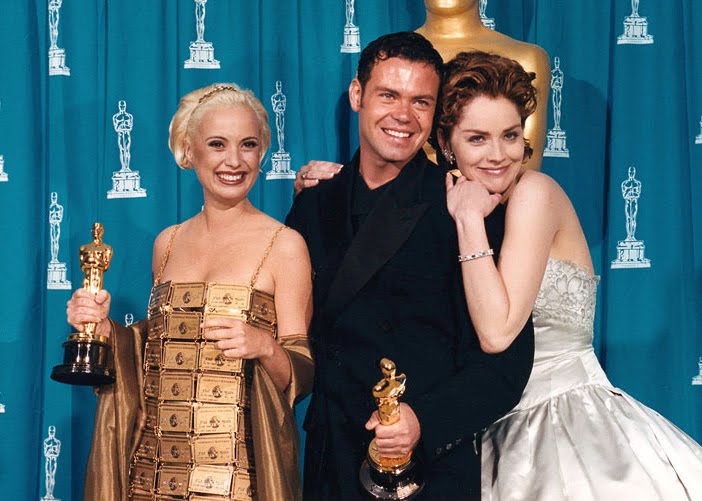 Sharon Stone with Oscar winning costume designers in 1995
Sharon Stone with Oscar winning costume designers in 1995
Lizzy's credit card dress was all anybody could talk about the next week in fashion reviews, outside of nominee Uma Thurman's lavender Prada that is.
Several Tony winners have gone on to repeat their wins at the Oscars when the stage plays or musicals transferred to the bigscreen (think Yul Brynner, Shirley Booth, etcetera) but it doesn't usually happen the other way around. Trivia Expert Question: would this be the first time that someone won a Tony for reprising an Oscar triumph?
 OTHER SILVER SCREEN CONNECTIONS!
OTHER SILVER SCREEN CONNECTIONS!
Let Them Double as Rental Suggestions If You Don't Have Access To the Stage Plays
Screen-To-Stage
Best Musical Nominees Catch Me If You Can, Sister Act and Best Musical no-shows that were nominated in other categories like Priscilla and Women on the Verge of a Nervous Breakdown are all stage adaptations of hit movies.
Stage-To-Screen and Back Again
Both Musical Revival nominees How To Succeed in Business Without Really Trying and Anything Goes have made trips to the big screen in 1967 and 1956 respectively. How To Succeed is a typical adaptation but the Anything Goes film bears extremely little resemblance to the stage musical apart from some of the same songs. Driving Miss Daisy wasn't a big success in these Tony nominations but Vanessa Redgrave was nominated for reprising the Jessica Tandy role, a role that started on the stage.
Compare and Contrast
War Horse, one of the big tickets in town, is based on the book. The book is also the source of the upcoming Oscar Bait film War Horse from Steven Spielberg. It's not an adaptation of the stage play but they're both adaptations of the book. Got it?
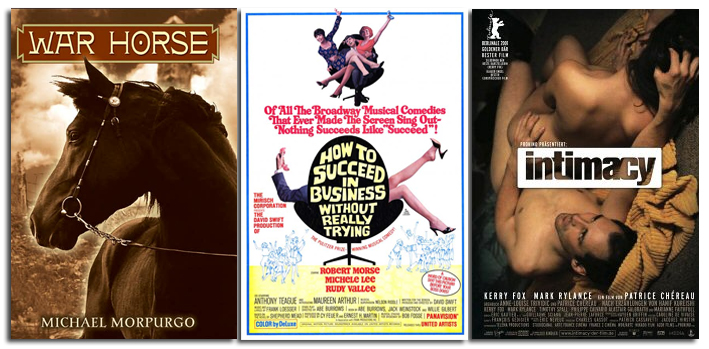 If you can't see the plays, read the books or see related films
If you can't see the plays, read the books or see related films
I've Seen That Face Somewhere Before
Mark Rylance, nominated for Jerusalem is a superb and acclaimed stage actor but unfortunately he doesn't work in movies very often. But some of you may remember him from his brief stint as leading man of controversially explicit films like the beautiful period piece Angels & Insects (1996) or the stinging drama Intimacy (2001). Lily Rabe, nominated for her Shakespearean work in The Merchant of Venice, is the daughter of Jill Clayburgh and you may have seen her in the movies No Reservations, Mona Lisa Smile or as Ryan Gosling's loyal friend in All Good Things.
 Ellen Barkin in "The Normal Heart" which has strangely never been made into a movieAnd though it pains me to admit it this, I've discovered recently that many younger readers are quite unfamiliar with Ellen Barkin. She's playing the stressed doctor in The Normal Heart, another revival of Larry Kramer's devastating AIDS drama (I saw the last revival which was great but people have been completely insane for this one so apparently it's unmissable.) Barkin's screen heyday was in the late 80s (notably The Big Easy with Dennis Quaid and Sea of Love with Al Pacino). Her last high profile studio movie gig was Oceans 13 (2007). She's also Julianne Moore's bestie though that's neither here nor there, just a fun factoid.
Ellen Barkin in "The Normal Heart" which has strangely never been made into a movieAnd though it pains me to admit it this, I've discovered recently that many younger readers are quite unfamiliar with Ellen Barkin. She's playing the stressed doctor in The Normal Heart, another revival of Larry Kramer's devastating AIDS drama (I saw the last revival which was great but people have been completely insane for this one so apparently it's unmissable.) Barkin's screen heyday was in the late 80s (notably The Big Easy with Dennis Quaid and Sea of Love with Al Pacino). Her last high profile studio movie gig was Oceans 13 (2007). She's also Julianne Moore's bestie though that's neither here nor there, just a fun factoid.
Mother Gothel!
Donna Murphy, who hopefully won an army of new fans with her great work in Tangled, is Tony nominated again for Best Actress in a Musical for playing a woman from youth to old age in the tearjerker The People in the Picture. Murphy is a two-time winner already.
Oscar Winners On Stage
Frances McDormand, Vanessa Redgrave and Al Pacino are all nominated for lead roles.
Will Any of The New Plays and Musicals Be Made Into Movies?
Your guess is as good as mine. Hairspray is a recent example of a movie that became a stage musical and then became a movie again based on its stage musical. Back and forth it goes. It's hard to know. Kander & Ebb's The Scottsboro Boys in particular might make an interesting transfer and we all know what happened with Cabaret and Chicago. Good People from David Lindsey Abaire has already had one of his acclaimed plays transferred (Rabbit Hole) and he's also a working screenwriter (his current gig being Oz: The Great and Powerful.) so maybe that show about a poor southie in Boston could make some sort of move.
 Tuesday, May 3, 2011 at 2:45PM
Tuesday, May 3, 2011 at 2:45PM 











